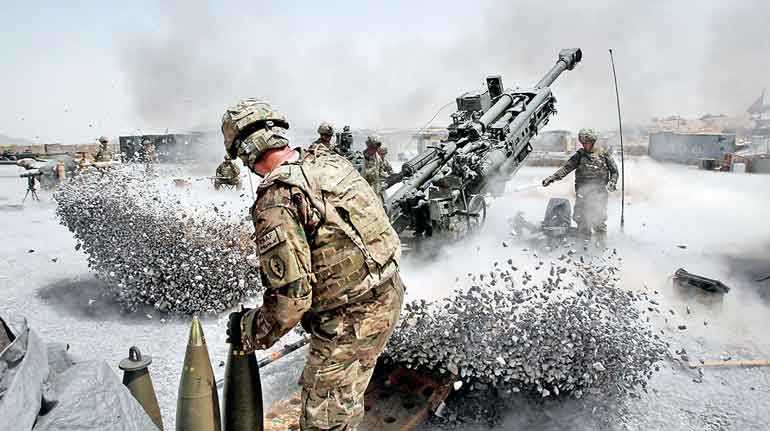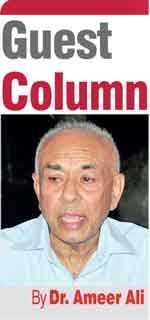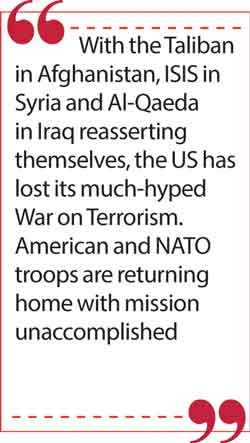Sunday Feb 15, 2026
Sunday Feb 15, 2026
Saturday, 2 February 2019 00:10 - - {{hitsCtrl.values.hits}}

When George Bush declared the “War on Terror” in 2001, he and his Washington cabal had no idea what they were getting into except a single-minded determination to invade Iraq and Afghanistan, control their resource assets, install puppet regimes, extend the American Empire and, in the course of achieving these, wipe out Al-Qaeda and the Taliban
 “If the history of knowledge about Islam in the West has been too closely tied to conquest and domination, the time has come to these ties to be severed completely. About this one cannot be too emphatic. For otherwise we will not only face protracted tension and perhaps even war, but we will offer the Muslim world, its various societies and states, the prospect of wars, unimaginable suffering, and disastrous upheavals, not the least of which would be the victory of an ‘Islam’ fully ready to play the role prepared for it by reaction, orthodoxy and desperation” – Edward Said, Covering Islam, New York: Vintage Books, 1997, pp. 172-173)
“If the history of knowledge about Islam in the West has been too closely tied to conquest and domination, the time has come to these ties to be severed completely. About this one cannot be too emphatic. For otherwise we will not only face protracted tension and perhaps even war, but we will offer the Muslim world, its various societies and states, the prospect of wars, unimaginable suffering, and disastrous upheavals, not the least of which would be the victory of an ‘Islam’ fully ready to play the role prepared for it by reaction, orthodoxy and desperation” – Edward Said, Covering Islam, New York: Vintage Books, 1997, pp. 172-173)
How prophetic are these words from a towering intellectual and scholar?
When George Bush declared the “War on Terror” in 2001, he and his Washington cabal had no idea what they were getting into except a single-minded determination to invade Iraq and Afghanistan, control their resource assets, install puppet regimes, extend the American Empire and, in the course of achieving these, wipe out Al-Qaeda and the Taliban.
In Iraq, they came to dig out Saddam Husain’s Weapons of Mass Destruction (WMD) with their own WMD. When they found no evidence of WMD in Iraq, Defence Secretary Donald Rumsfeld rhetorically pronounced that, “absence of evidence does not mean evidence of absence” and used WMD to destroy that country. After less than two years of indiscriminate bombing, killing, torture and loot, on 1 May 2003, George Bush declared from the aircraft carrier USS Abraham Lincoln, “Mission Accomplished”. How hasty and unwise was he then is now public knowledge.
When Barack Obama succeeded Bush and inherited the war and the chaos, he realised that US had to get out of the quagmire without losing face and came with a new excuse that his country was fighting a wrong war in the wrong place. He therefore decided to withdraw US troops from Iraq in stages while increasing them in Afghanistan. The American occupation succeeded in substituting Iraqi nationalism with Sunni-Shia sectarianism and Kurdish ethnicity.
In the meantime, Arab Spring broke out in 2011 plunging the entire Middle East into a cauldron and continuing to burn fiercely in Syria till today. Arab Spring brought forth a new player to the scene, Islamic State of Iraq and Syria/Levant (ISIS/L) or in short, Islamic State (IS). Among the numerous anti-American fighters in the Muslim world today, the three prominent ones, Al-Qaeda, the Taliban and ISIS – all of whom were born from the Wahhabi womb, are alive and kicking, with losses of course, but in spite of the weaponry might of US and her allies. By invading Iraq and Afghanistan to end terrorism the invaders succeeded in making it a pandemic cancer.
Today, after nearly 18 years of indiscriminate bombing, killing and torture by the conquerors, the Taliban controls more territory in Afghanistan than the country’s US supported regime. A situation has reached where there is no alternative for the superpower but to negotiate with Taliban. History has proved over and over again to imperialists that it may be easier to conquer a foreign country but difficult to keep control over it. Afghanistan and Iraq are the latest examples of history’s truism.
In Syria, by joining the war against Iran-Russia backed Alawite Assad, Al-Qaeda has won the favour of Sunni Arabs and is fighting along with the Free Syrian Army (FSA), which is financed and armed by the Saudis and US. This means US is indirectly supporting its old terror enemy Al-Qaeda. This is true in Yemen also. ISIS, the youngest of the Wahhabi siblings, has also joined the anti-Assad coalition and is reported to be receiving American weapons through FSA and through Qatar. To the US therefore, as the saying goes, an enemy’s enemies have become friends. So, what happened to the War on Terrorism? Who and where are the terrorists now?
At last, Trump has realised the futility of Georg Bush’s misadventures in Iraq and Afghanistan and Obama’s drone warfare backed by troops in Syria. The occupation of Afghanistan and Iraq alone has cost US citizens $1.6 trillion ($1,600,000,000,000).
According to a report by Tom Engelhart, the co-founder of the American Empire Project, the War on Terror has reached $5.6 trillion and interest payment on funds borrowed to finance that war may cost another $7.9 trillion by the middle of this century.
A recent tweeted message posted by Donald Trump says, “After having foolishly spent $7 trillion in Middle East, it is time to start building our country.” These are mind boggling figures far beyond comprehension for ordinary individuals.
A president who wants to make “America Great Again” finds these colossal amounts a terrible drain on the treasury and no more affordable. Hence, his decision to withdraw from Afghanistan and Syria at least to save money. On a questionable positive side however, American misadventures have induced an economic growth world over based on militarism. What will be the consequences of the withdrawal?
In the current negotiations between the US envoy Zalmay Khalizad and Taliban the latter is engaging from position of strength, while the US and NATO are in a hurry to get out of Afghanistan – a scenario similar to one the British faced in India during the last years of their colonial regime. In a rush to cut and run the British drew an arbitrary line of territorial division, created two countries, which eventually became three of which two are still in a state of war with each other.
Unlike India where two religious communities were clashing, Afghanistan is a smorgasbord of ethnic communities, tribes and sects within Islam. The Taliban are Sunni fundamentalists with many commonalities with Saudi Wahhabism. They are anti-Shia and have very extreme views about status of women and social life. Thus, in its hasty retreat, if US hands over the Taliban a disproportionately critical role in Afghan governance, the aftermath of the peace settlement will be the resumption of Taliban’s previous terror rule with an added danger of spreading its influence into neighbouring Pakistan. It will also allow Iran to come to the aid of the Afghani Shia who are destined to suffer under Taliban rule.
It was the American weapons with Saudi money that created the Taliban in the first place. Now the Taliban is virtually holding the US hostage. The US also boasted that its mission in  Afghanistan was to liberate the women. Have they? “The US has failed in Afghanistan. They will leave a deeply divided country in which reconciliation will be difficult. The war may soon be over for the Americans, but not for the Afghans.” (Patrick Cockburn, The Age of Jihad, New York: Verso, 2017, p. 204.)
Afghanistan was to liberate the women. Have they? “The US has failed in Afghanistan. They will leave a deeply divided country in which reconciliation will be difficult. The war may soon be over for the Americans, but not for the Afghans.” (Patrick Cockburn, The Age of Jihad, New York: Verso, 2017, p. 204.)
In Syria too the US wants to cut and run. Although ISIS has lost a fair amount of its territory, it is not a spent force yet. Having failed to wipe out ISIS, Trump now expects Turkey to do the job for him. However, for Turkey the main enemy is not ISIS but Kurds. While Turkey starts fighting the Kurds in spite of American threat of sanctions, Assad’s hands will grow stronger in Syria with the support of Iran and Russia. That leaves room for ISIS either singularly or in collusion with Al-Qaeda to reassert itself and recover some of its losses.
In the choice between ISIS and Russia-Iran-Assad coalition will the US dare to oppose ISIS, which is destined to draw support from Arab Sunni quarters? Once again, the US will be driven to treat the enemy’s enemy a friend. These are unpalatable truths which the main stream media and Middle East experts in the West will not discuss or publish.
From the time when the US declared the so called War on Terrorism, many intellectuals, both Muslim and non-Muslim, were urging policy makers to investigate the fundamental causes that produce terrorism. Once again, it was George Bush who asked the question, “Why do they hate us?” and answered himself that, “because, they hate our freedom and democracy”. After that, no one dared to raise the same question again or challenge his answer for fear of being dubbed as terrorist sympathiser.
It was the foremost Jewish living intellectual Noam Chomsky, who ventured to advise Washington, that if it wanted to “eradicate mosquitoes it should first clean up the swamps”. The US is now leaving Afghanistan and Syria after creating more swamps. “What a wonderful world” the superpower has created in the Middle East!
One important consequence of the US invasion and occupation of Iraq and Syria is the growth of Muslim sectarianism in the Middle East. In promoting this the US was in cahoots with the Saudi regime. The entire Middle East and North Africa (MENA) has now been sectarianised, and that unfortunately will be the permanent legacy of the mess created by the US invasion.
With the Taliban in Afghanistan, ISIS in Syria and Al-Qaeda in Iraq reasserting themselves, the US has lost its much-hyped War on Terrorism. American and NATO troops are returning home with mission unaccomplished. As Said predicted in the quote at the beginning, the aftermath of US withdrawal will be a “victory of an ‘Islam’ fully ready to play the role prepared for it by reaction, orthodoxy and desperation”.
(The writer is attached to the School of Business and Governance, Murdoch University, Western Australia.)